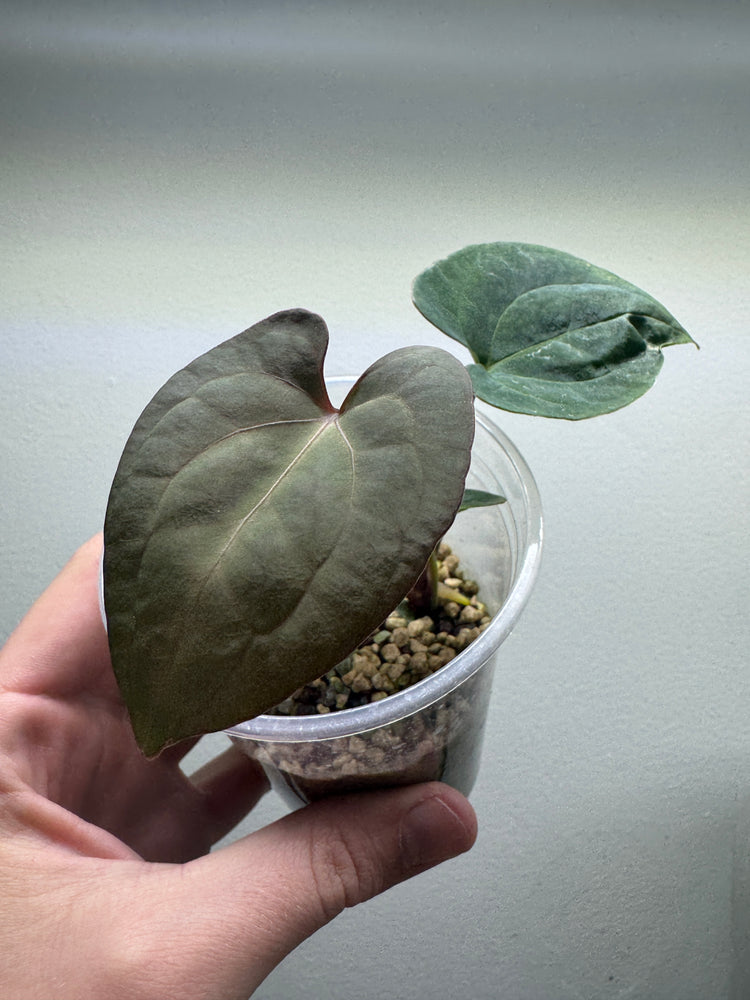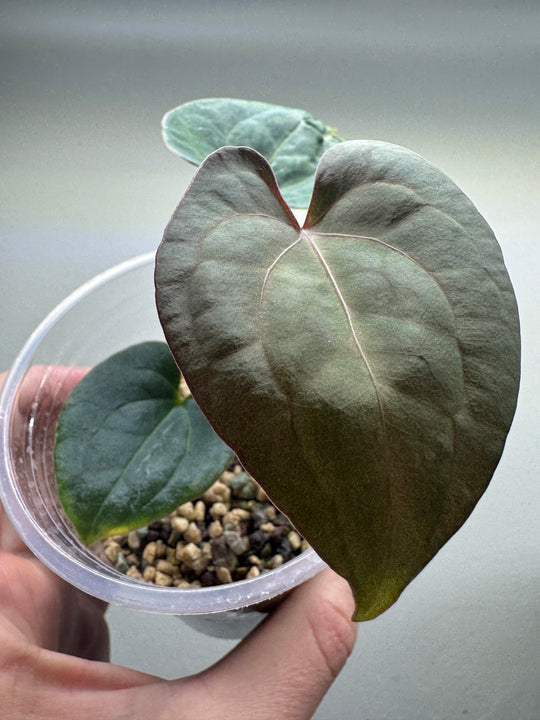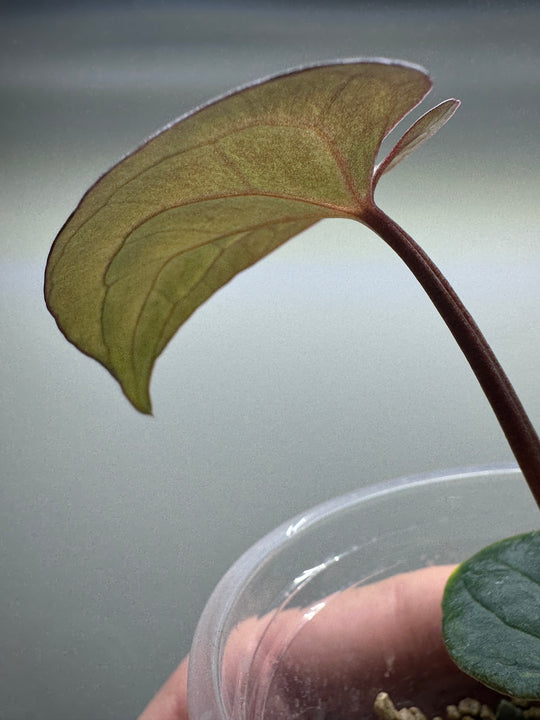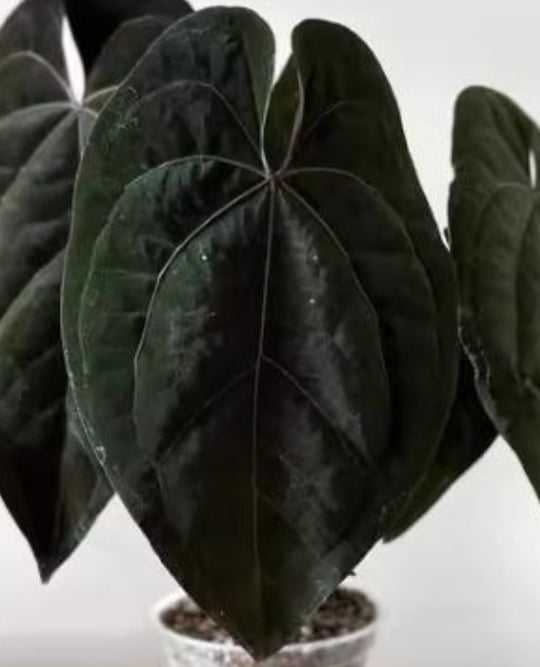



Plantthatplant
Anthurium ’Dark Phoenix’
Anthurium ’Dark Phoenix’
Couldn't load pickup availability
Share
Anthurium 'Dark Phoenix' is an extraordinary hybrid that has captured the attention of plant enthusiasts and collectors alike. This hybrid is known for its dramatic, dark-colored foliage that exudes an air of mystery and elegance. The exact parentage of 'Dark Phoenix' is often kept secret by breeders, but it is likely a cross between species that contribute to its deep coloration, striking veining, and overall robust appearance.
Aesthetic Characteristics
Anthurium 'Dark Phoenix' is a standout variety, renowned for its striking visual appeal:
-
Leaf Shape and Texture: The leaves of 'Dark Phoenix' are typically heart-shaped, large, and have a velvety texture that enhances their deep color. The texture adds a luxurious, almost tactile quality to the plant, making it a visual and sensory centerpiece in any collection.
-
Coloration and Veining: The hallmark of 'Dark Phoenix' is its dark, almost black-green leaves, often with a slight reddish or purplish hue, especially in new growth. The veins are usually a contrasting lighter color, often silvery or white, which creates a stunning contrast against the dark leaf surface. This contrast gives the leaves a dramatic appearance, reminiscent of a phoenix rising from the ashes—hence the name.
-
Growth Habit: 'Dark Phoenix' typically exhibits a compact and upright growth habit, making it well-suited for indoor cultivation. The plant is likely to produce new leaves regularly, each one contributing to its overall lush and dense appearance.
Care Requirements in an Indoor Setting
To keep Anthurium 'Dark Phoenix' thriving, it's important to replicate the warm, humid conditions of its tropical origins:
-
Light Requirements:
- Optimal Light: 'Dark Phoenix' thrives in bright, indirect light, which is essential for maintaining its rich, dark coloration. Direct sunlight should be avoided, as it can cause the leaves to bleach and lose their characteristic dark tones. If natural light is limited, especially during the winter months, consider using LED grow lights to supplement.
-
Temperature and Humidity:
- Temperature: This hybrid prefers temperatures between 18-25°C (65-77°F). It’s important to avoid cold drafts and sudden temperature fluctuations, which can stress the plant and hinder its growth.
- Humidity: High humidity (60-80%) is crucial for 'Dark Phoenix'. In drier indoor environments, particularly in the winter, using a humidifier or placing the plant on a humidity tray can help maintain the necessary moisture levels. Regular misting can also be beneficial, though it’s important to avoid leaving water on the leaves for too long to prevent fungal issues.
-
Watering:
- Watering Schedule: Water 'Dark Phoenix' when the top inch of soil feels dry. The key is to keep the soil consistently moist but never waterlogged. Overwatering can lead to root rot, which is a common issue with Anthuriums if they are kept too wet. In winter, reduce watering frequency as the plant’s growth naturally slows.
-
Soil and Potting:
- Soil Mix: Use a well-draining, loose soil mix that allows for good aeration around the roots. A combination of orchid bark, perlite, and peat moss or coco coir works well, mimicking the plant's natural epiphytic growing conditions. This mix ensures that excess water drains away, preventing root rot.
- Repotting: Repot the plant every 1-2 years, or when it outgrows its pot. Choose a pot that is only slightly larger than the current one to prevent over-potting, which can cause issues with moisture retention.
-
Fertilization:
- Feeding: During the growing season (spring and summer), feed 'Dark Phoenix' every 4-6 weeks with a balanced, diluted liquid fertilizer. This will support healthy growth and maintain the vibrant contrast in the leaf coloration. Reduce feeding during the winter months when the plant’s growth slows.
-
Pest Control:
- Common Pests: 'Dark Phoenix' may be susceptible to common houseplant pests such as spider mites, aphids, and mealybugs. Regularly inspect the leaves for any signs of pests, particularly the undersides where pests often hide.
- Prevention and Treatment: If pests are detected, treat the plant with insecticidal soap or neem oil. Maintaining high humidity and proper air circulation can also help deter pests and prevent infestations.








